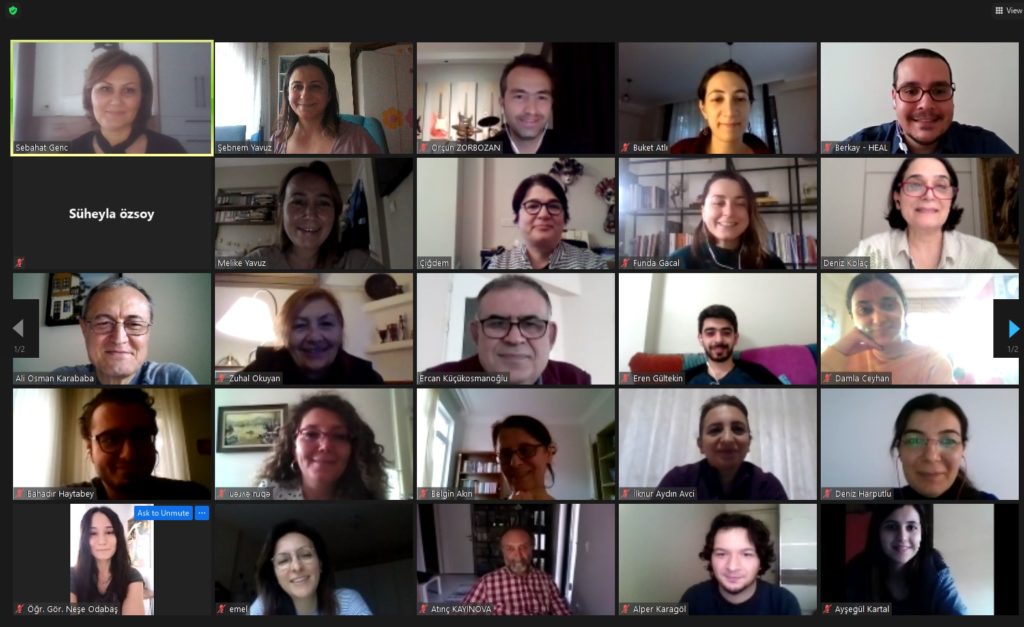Together with HASUDER – the Association Of Public Health Specialists and Kocaeli University, Department of Public Health, HEAL launched the “Health Collaboration on Climate Change and Environment Project” (Turkish abbreviation ‘ÇİSİP’) last year, and can look back at eventful twelve months.
The project is financed by the European Union and will run until 2023. In the past months, exciting activities have taken place in five main strands of work, including virtual capacity building trainings and discussion webinars, the publication of materials, social and traditional media work, as well as exchanges with European and international health colleagues.
For the latter, exchanges took place as part of the HASUDER 2020 congress, with a webinar on Healthy Recovery that saw the first presentation of the EEA report on “Healthy Environment, Healthy Lives, for Turkey; and at the First Climate change and health congress in April 2021, with a webinar on fossil fuels and health. Project partners also developed a briefing on One Health and Climate change, to facilitate the uptake of this concept which is highly relevant in this pandemic time (see Turkish PR here).
In February 2021, CISIP members and interested partners came together for a network meeting, to discuss the opportunities and challenges of working on the environment and climate in Turkey. As one of the outcomes, four working groups have been established to dig deeper into specific issues, with the aim of enabling the sharing of new science, and discussing of messaging, advocacy and activities.
 These include:
These include:
- Climate change & health: According to WHO, Climate change is the greatest challenge for public health of the 21st century. In this working group, participants aim to consider the effects of climate change on health in Turkey, and establish an international collaboration for knowledge-sharing. With a first webinar on heatwaves and health in July 2020 we presented one of the key climate themes to Turkish health participants. Further webinars and materials will be launched in the next months, including an interdisciplinary briefing. The international climate negotiations COP 26 in November will be another key moment for the group to engage in.
- Air pollution & health: Poor air quality is the largest environmental risk for health in Turkey, and health actors are the key experts to engage for clean air. In order to build health sector capacity, a first AirQ+ training was organised in December 2020, bringing together over 40 participants. AirQ+ is a tool developed by WHO which allows for the calculation of health impacts of air pollution at local and national level. A key milestone in the next months will be the publication of the revised WHO air quality guidelines.
- Health Impact Assessment (HIA): Health Impact Assessment is an approach to consider and calculate the health cost and benefits of a certain measure, plan or programme. While public institutions in Australia, Denmark, Lithuania, Ireland and England etc apply HIA, legislative support in Turkey is missing. With this working group we aim to train health experts on this methodology, and contribute to policy deliberations on this issue.
- Agriculture: This working group aims to consider the triangle between agriculture-climate change-health, and the interlinkages of health harm, e.g. through the use of fossil fuels. A first webinar to scope the themes is foreseen for autumn 2021.
In April 2021, eleven health organisations in Turkey called the Commission on Drought and Climate Change under Turkish Parliament to action and define health risks of climate change.
Representatives from Turkish health organisation or individuals are welcome to get in touch for any further information:
Berkay Hacimustafa,Project Coordinator, berkay@env-health.org
Funda Gacal, Project Supervisor, funda@env-health.org
Follow us on social media:
Twitter: https://twitter.com/CISIP_TR
Facebook: https://www.facebook.com/CISIPTR
Instagram: https://www.instagram.com/cisiptr/

 These include:
These include:
